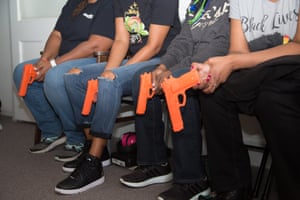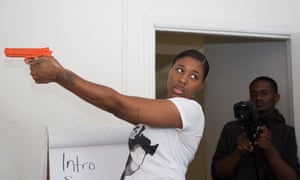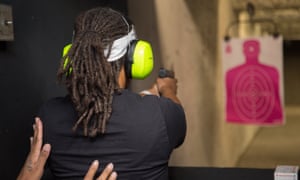African American women organizing shooting classes are finding a surge of interest – and many say it comes down to feeling less safe in the era of Trump
Resumen:
It was a modest setting for the launch of a movement: 10 African American women sat on folding metal chairs lining the edges of a small, gray-carpeted room on the second floor of the Bullseye Indoor Range and Gun Shop in Lawrenceville, Georgia. They nervously giggled as Marchelle Tigner began her lesson. Seven of them had never held a gun before.
“This is a movement, and it starts now,” Tigner told her students. Heads nodded.
The class was one of four scheduled back to back on 26 February, to meet unexpected demand as dozens had responded to announcements on Facebook for Tigner’s first Atlanta-area class for black women to learn to shoot.
micThe movement, she said later, is no more and no less than “black women learning how to shoot, and purchasing firearms”, and it’s happening in cities across the country.

Tigner, who lives in Savannah, Georgia, sensed that there was pent-up demand when she launched Trigger Happy Firearm Instruction in November. She found the Bullseye firing range near Atlanta and offered the class through social media, hoping for 20 students. But the class sold out in two days, so she expanded it to 40. Another class scheduled for 4 March sold out to 40 students in 24 hours; a third class for 30 on 18 March sold out in 30 hours; and so did a fourth on 19 March. Tigner’s now got classes scheduled through the end of May, including several in Fort Lauderdale, Florida.
She said she’s surprised at the response her classes have received. “The growth of these classes – I never expected it,” she said. “It shows me how unsafe these women feel in their communities.”
Meanwhile, in Cincinnati, Tiffany Ware, 44 – founder of the Brown Girls Project, which offers makeup workshops and other activities for building self-esteem in young black girls – organized a group of black women for a firearms training class on 18 December. The cap of 20 was quickly met; 45 signed up for a waiting list. Another class was held a few weeks later. A waiting list soon grew to more than 100, and now Ware organizes monthly classes.
In Dallas, the Black Women’s Defense League, launched in 2015, has seen the number of black women signing up for time at local shooting ranges at least double in the past 10 months or so.
“I can confirm that more African American women are learning to shoot,” said Kenn Blanchard, author of Black Man with a Gun, a gun ownership manual. “I’m getting emails from places like Pennsylvania, Arizona, saying: ‘Hey Kenn, these seven ladies were shooting – look at their scores.’ That’s never happened before,” said Blanchard, who’s based in Maryland.

Tigner’s business partner in the Atlanta-area classes, Amber Anderson, said one motivation for their activity is that she and the instructor are both domestic violence survivors, and learning to use a firearm promotes self-defense. Also, she said: “With the political climate being as unstable as it is, black women can be the target.”
Ware, in Cincinnati, has similar concerns. She said that, before last year, “I had heard the N-word, in person, twice in my life”. In the past year, she said: “I’ve heard it five times.” Once, “it was guys driving by in a car – they shouted at a bunch of black girls and threw something out the window.”
Ware described these episodes as “disheartening,” adding: “I had never not felt safe before. Now, it felt different.”
After election day, she explained, “my girlfriends and others started connecting online”. They found a black male instructor in the area, and Ware began organizing classes for her friends and then for other women. Ware described the response – full classes and a waitlist – with the same word Tigner used: “It’s almost like I accidentally fell into this movement.”
Nicholas Johnson, law professor at Fordham University and author of Negroes and the Gun: The Black Tradition of Arms, pointed to a 2014 survey showing that 54% of black people felt that owning guns did “more to protect people than endanger personal safety”, nearly doubling the 29% who said the same two years earlier. “I would not be surprised if it is stronger now, with the idea that the political environment has tacitly approved violent behavior,” he said.
The violence that worries Ware – interracial violence – is historically less common than intraracial violence, but it produces more anxiety, Johnson said. “Interracial violence resonates differently because it’s clearly an attack by one group on another,” he explained. “It’s likely that the social environment is such that there’s a fear we’re back to the 1950s.”
Niecee X, one of the founders of the Black Women’s Defense League in Dallas, said Trump’s campaign and presidency “has changed people’s views about what they thought was possible. A lot of people are feeling unsafe.”
But Ty Shaw – who launched an Atlanta-area group called Armed Empress in late January that has about 50 members interested in gun classes and plans to expand to Texas and New York – said that calling attention to the recent political or social climate and Trump’s election as driving forces behind the increasing interest of black women in self-defense and arms “implies that there was ever a time where women of color didn’t have to be concerned about their safety”. At the same time, in the past year or so, racists have become “more blatant and overt”, she said.
In any case, she concluded: “Violence is deeply connected to the black experience.”
When asked whether black women becoming more visibly identified with guns could itself produce violent pushback, Niecee X said: “There’s never been a time where there hasn’t been a repression of black gun owners,” referring to the historyof gun control laws, many of which came about in the late 1960s as a response to efforts by the Black Panthers to legally arm themselves and carry firearms in public. “But my ability to protect my family outweighs my fear” of any pushback, she added.

Another possible outcome of black women becoming more interested in buying guns and learning to use them is that the NRA becomes more aware of them as a group, Niecee X said.
The NRA’s longstanding program of outreach to women, recently branded “Armed and Fabulous”, began running online ads in 2016 featuring conservative pundit Dana Loesch and others that highlighted violence against women – including sexual violence – as a reason for women to become gun owners.
“There’s never been a better time to show them, ‘You are not shut out of this lifestyle,’” Brown said.
The organization has also been reaching out to black firearm owners and advocates such as Antonia Okafor, founder and president of a campus carry group for college women called EmPOWERed, who starred in one of the 2016 ads and is the only black woman scheduled to speak at a leadership forum where Donald Trump is also slated to appear, at the NRA’s annual meeting on 28 April in Atlanta.
“These individuals in popular culture and media are influencers, and can reach people that we can’t,” said Brown, of Okafor and other women the NRA is spotlighting. “They’re building relationships that can influence that community.”
Okafor, who’s 27, said she has been called an Uncle Tom, adding that “black women are … my biggest critics”. At the same time, she said: “People don’t know me, or how I came to my beliefs.” She sees the growth in interest in firearms among black women as part of an increasing interest among women in general. “My experience comes more from being a woman and being empowered through my gun.”
But reaching potential black gun owners will require overcoming a historical divide between the NRA and many African Americans. “The NRA has a bad name in the black community,” Niecee X said, echoing some of the other black women who are organizing shooting classes.
She said that the organization doesn’t “reach out to the black community when things have happened”, noting the NRA’s muted response after Philando Castile was shot and killed by a police officer while carrying a licensed firearm. She added that the Black Women’s Defense League, for instance, is “reluctant to be somebody’s show pony – ‘oh, now we like black people’”.
Meanwhile Okafor wants to teach more classes, and said that black female instructors like Tigner are “rare”. Having a “black woman instructor increases the feeling of safety for black women … [and] the industry is mostly white and male”, she said. “That’s part of why I feel so strongly that I do become an example – if you see someone like you do something, you feel like you can do it.”
Fuente: https://www.theguardian.com/world/2017/apr/27/black-women-guns-classes-racism-trump






 Users Today : 35
Users Today : 35 Total Users : 35460052
Total Users : 35460052 Views Today : 50
Views Today : 50 Total views : 3418681
Total views : 3418681